Columns
In a snapshot, big stories of the year
View(s):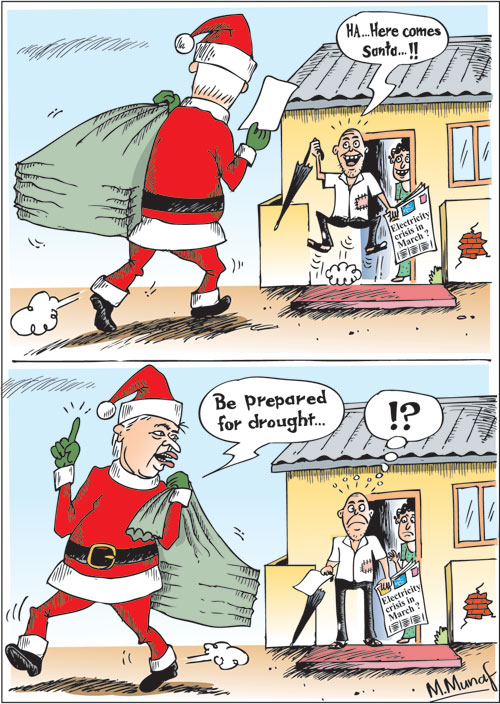
January 3
As 2016 dawned, the National Unity Government was still in conflict with major differences between the UNP and the SLFP and the split within the SLFP itself widening. But on the positive side, plans were being drawn up for a new agreement for the two major parties to work together at least till the Government’s term ends.
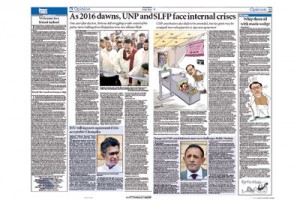
January 17
Former President Mahinda Rajapaksa loyalists work out plans for a new party led by him to contest the local council elections which have still not been held. Mr. Rajapaksa met local council members to work the strategy.
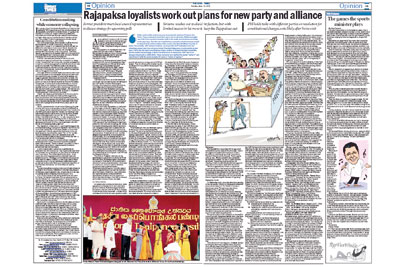
February 7
The Financial Crimes Investigations Division hits the headlines by arresting former President Mahinda Rajapaksa’s second son, Yoshitha, in connection with financial irregularities over the setting up of the Carlton Sports Network. Some SLFP ministers were angry and wanted the FCID disbanded. But it did not happen. Yoshitha was later given bail.
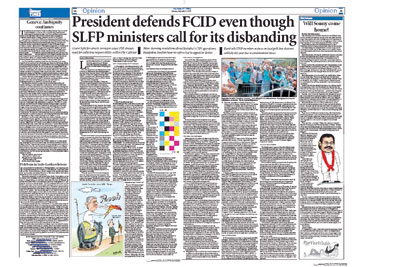
February 14
There was both good and bad news for the Government during the four-day visit to Sri Lanka by the United Nations Human Rights High Commissioner Zeid Ra’ad Al Hussein. The climate was much better than what it was during the Rajapaksa regime and when South Africa’s Navi Pillay was the chief of the UNHRC. Prime Minister Ranil Wickremesinghe outlined Sri Lanka’s plan to conduct a probe through a Lankan judicial mechanism, but Prince Zeid in an eight-page statement said the Government would need to prove its credibility through performance.
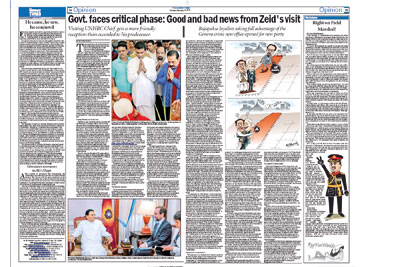
February 21
Our Political Editor and a team of journalists visit the North for a first hand analysis of what is happening. They reported that the face of the North is changing and the region is growing faster than any other. But they also saw the attendant negatives such as the North becoming a hub for Kerala Ganja and liquor consumption rising. Jaffna’s Divisional Military Commander is transferred after a dispute with Foreign Affairs Minister Mangala Samaraweera over the Geneva issue.
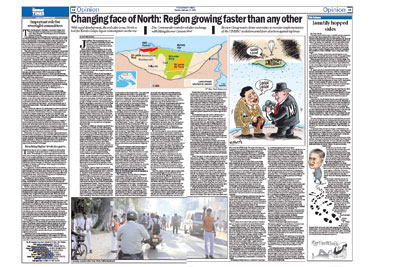
April 3
With the Government facing an economic crisis largely because of the billions of dollars of loans to be repaid, crucial talks are held with the International Monetary Fund. They were successful. Meanwhile, the Prime Minister made a vital visit to China to discuss a plan whereby loans were to be swapped with equities in major projects here.
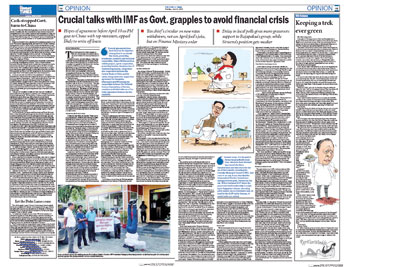
April 24
May Day this year had a political significance. Though the two main parties, the UNP and the SLFP, had formed a national unity government, more than half of the UPFA members had broken away to form the Mahinda Rajapaksa faction or the so-called Joint Opposition. (On May Day the pro-Sirisena faction held its rally in Galle and the pro-Rajapaksa faction in Colombo. Amid widespread speculation about who and how many people would turn up at these rival rallies, the pro-Sirisena rally eventually drew a bigger crowd.) In the week before the rallies, President Sirisena expressed concern that the UNP was going soft on the probes on corruption charges against the Rajapaksa family members and other leaders of the previous regime.
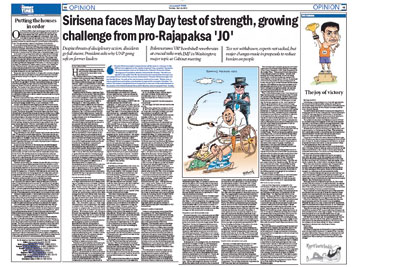
May 15
With the cost of living soaring and the delays continuing in the probes on major corruptions rackets, the Government’s popularity takes a beating. Plans to increase the Value Added Tax to 15 percent cause further turmoil.
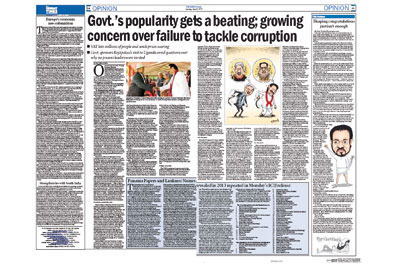
May 22
As the controversy continues over the alleged delay in probing corruption charges against VIPs of the former regime, four ministers submitted a Cabinet memorandum asking for, the probe to be expedited. The Ministers were Patali Champika Ranawaka, Rajitha Senaratne, Arjuna Ranatunga and Field Marshal Sarath Fonseka. President Sirisena preempts the move and says he will give them a confidential briefing, but Minister Senaratne also alleges that some Cabinet moles are leaking information to the Rajapaksa group.
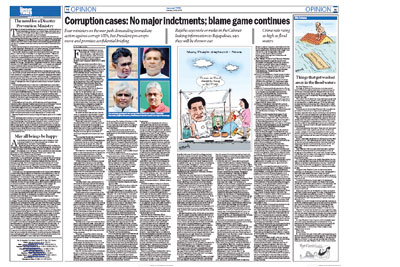
May 29
Amid conflicting and sometimes contradictory reports, Prime Minister Ranil Wickremesinghe tells the Army high command that any probe on alleged war crimes will be by a domestic judicial mechanism without the involvement of foreign judges. Meanwhile, more practical steps are taken for reconciliation and national unity. A high-powered Office of Missing Persons is to be set up while the armed services returned more private land in the North-East to civilian owners. But the Tamil National Alliance is concerned that the Geneva Resolution regarding the alleged war crimes probe is being watered down.
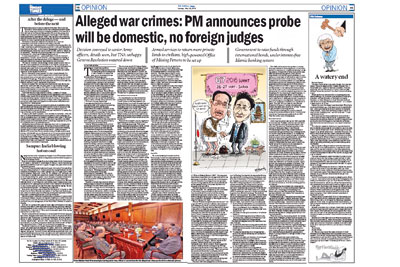
June 5
Sri Lanka’s image in the international community improves as President Sirisena meets United States President Barack Obama and other G-7 leaders at their summit in Japan.
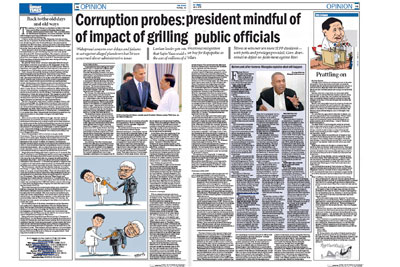
June 19
As the Government continues to tackle the economic crisis, it is forced to make more borrowing and impose more taxes thus provoking more public concerns. Finance Minister Ravi Karunanayake’s 2016 Budget is subjected to revision after revision prompting opposition critics to describe it as a salad.
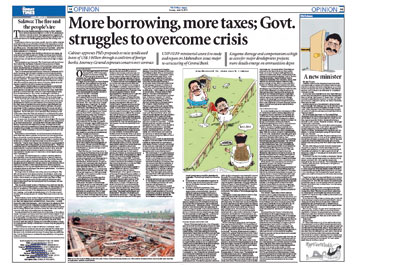
June 26
President Sirisena again insists that the executive presidency should be abolished. Differences between the UNP and the SLFP on whether the new constitution or electoral reforms should come first. Civil society groups, unhappy over the Government’s failure to fulfil some of its main promises, meet the president to take the issues. Meanwhile, it is revealed that a UNP minister had ordered that STF security be provided to the discredited former monitoring MP Sajin Vaas Gunawardene.
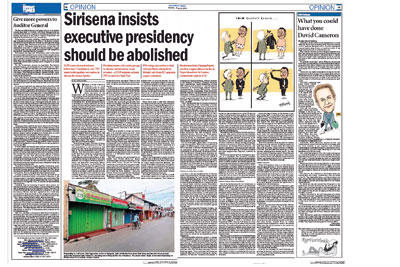
July 3
President Sirisena calls the shots and appoints top economist Indrajit Coomaraswamy as the new governor of the Central Bank. This came amid a continuing controversy over former Governor Arjuna Mahendran in connection with the alleged bond issue involving a company linked to his son-in-law. Premier Wickremesinghe is said to have preferred former Treasury Secretary Charitha Ratwatte as governor, but the PM and senior Minister Malik Samarawickreme were called by the President and told of his decision to appoint Dr. Coomaraswamy.
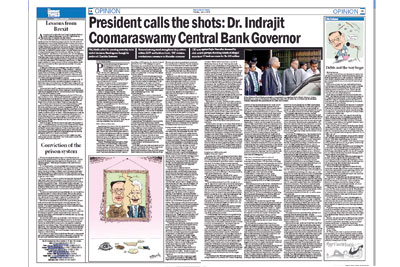
July 24
The UNP and the SLFP agreed to a marriage of convenience. They signed an agreement to work together for five years. Meanwhile, President Maithripala Sirisena is reported to have been furious over a big march by Rajapaksa loyalists in the SLFP.
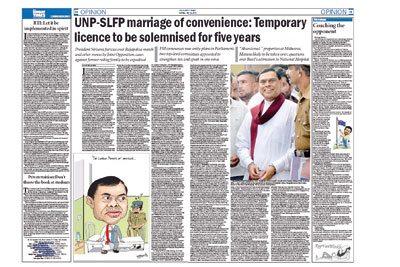
August 7
The National Government which had vowed to cancel the Colombo Port City project with China now works out a new agreement to set up an international financial city. The premier explains practical economic benefits for Sri Lanka. But SLFP ministers who silently agreed to the project under the Rajapaksa regime now voice concerns. The PM is furious but the President cools him down.
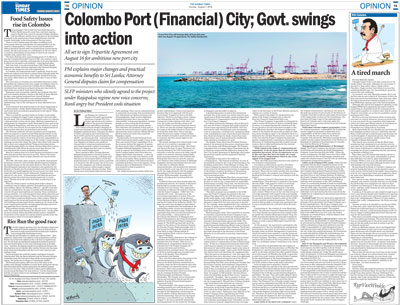
August 21
President Sirisena cracks the whip, removing 16 SLFP electoral organisers and 24 District Organisers. They were seen as Rajapaksa loyalists. The Rajapaksa faction reacts by intensifying moves to form a new political party to contest next year’s local polls.
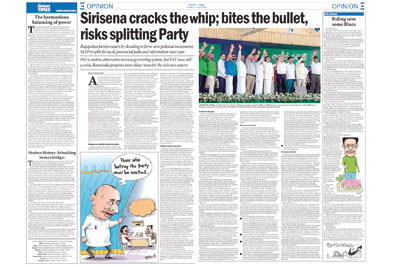
Sept 18
Minister Malik Samarawickrema is behind hiring a US company to make Sri Lanka “a vibrant social market economy” though an eco-friendly all inclusive development strategy. The crashlanding national carrier SriLankan airlines receives more Treasury funds to continue flying till a public-private partnership is worked out.
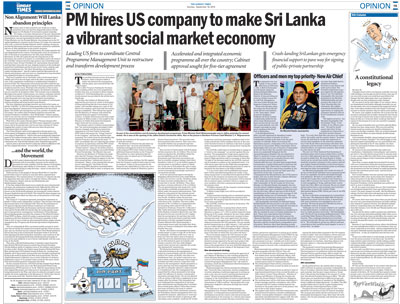
Sept 25
President Sirisena goes to the United Nations headquarters in New York again to attend the annual sessions. He meets world leaders and seeks their support to make Sri Lanka an exemplary democracy. Our Political Editor covers the visit from New York.
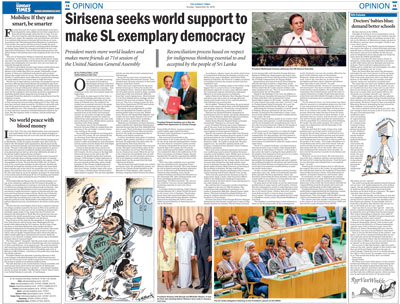
Oct 2
President Sirisena presents to Cabinet an 11-page draft outlining practical steps for national reconciliation and unity. The draft focuses on power-sharing for political settlement to address grievances and aspirations of all communities. It also addresses issues relating to human rights, inclusivity, diversity, multiculturalism, gender equality and judicial independence. But former President Rajapaksa scoffs at it.
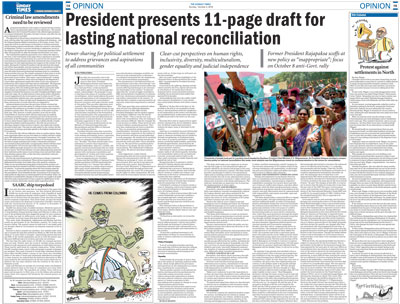
Oct 16
For the first time in his 21-month tenure as President of Sri Lanka, Sirisena fires strong salvos at his own Government. He warns he will take action if the CID, the FCID or the Bribery Commission was found to be working on a “political agenda.” He said he was displeased at the manner in which former Defence Secretary Gotabaya Rajapaksa and three former Commanders of the Navy were hauled up before court recently and kept in a cell till hearings were completed.
But the civic action groups and the JVP express concern over the President’s remarks asking whether it will be a case of political interference with the police and the legal process again.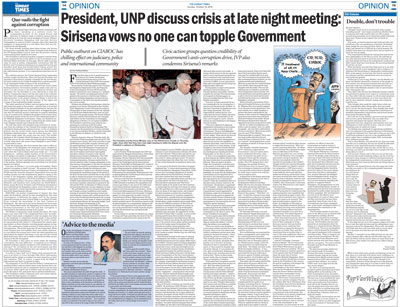
Oct 30
The Parliamentary Committee on Public Enterprises (COPE) issues its much-awaited report on the 2015 bond issue involving former Central Bank Governor Arjuna Mahendran. COPE named and shamed those involved. But some COPE members representing the UNP add some footnotes to the report dissenting.

Nov 6
President Sirisena in an exclusive interview with our Political Editor makes some startling disclosures. He expresses concern that the probe may have virtually ceased on the multimillion dollar Dubai secret bank account allegedly held by the VIPs of the former regime. He also expresses his fears that the probe on the murder of national ruggerite Wasim Thajudeen, allegedly involving a VIP’s son, may have gone under. He calls on the CID and the FCID to expedite the probes on mega cases instead of the so-called “Carrom-Board” cases.
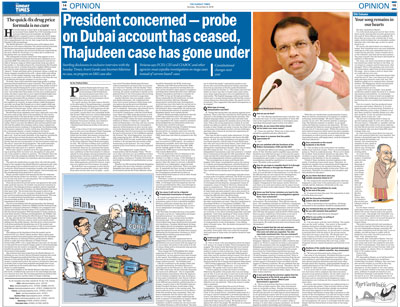
November 13
The Cabinet discusses the 2017 Budget proposals. The President and ministers of both parties say 2017 Budget is the best in many years. But divisions persist on issues relating to the bond controversy and COPE report. The SLFP ministers want Parliament to initiate action against those involved.
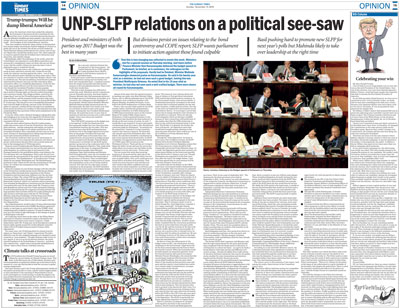
November 20
President Sirisena puts the SLFP on a virtual ‘war footing’ for next year’s local council polls. He appoints new electoral organisers loyal to him and tells them to get about 5 million people to join the party. It was seen as an urgent move by him to counter the campaign by the new pro-Rajapaksa party. In the afterglow of the two-thirds majority for Budget, the UNP focuses on big economic projects, still leaning on China with the West giving little.
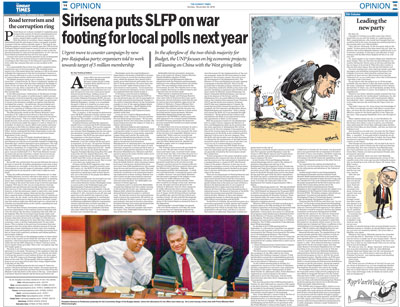
December 11
The December 6 Cabinet meeting turns out to be stormy as a lengthy discussion ensues on the Government’s inaction over investigations into major cases of bribery and corruption. Minister Rajitha Senaratne discloses that those who were now being prosecuted have received files containing statements and other documents related to investigations against them, while Minister Patali Champika Ranawaka threatens to go public if no action is taken against big-time racketeers.
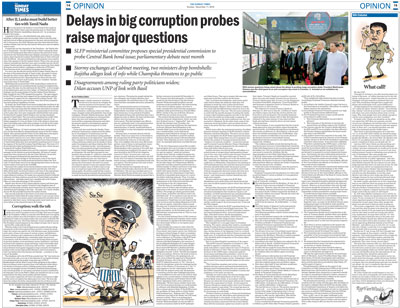
December 18
After weeks and months of squabbling, the President considers a proposal by 18 Cabinet ministers to appoint a wide-powered Criminal Justice Commission to investigate and punish big-time racketeers. The Commission will likely be similar to the CJC appointed in 1972 but with appropriate changes.
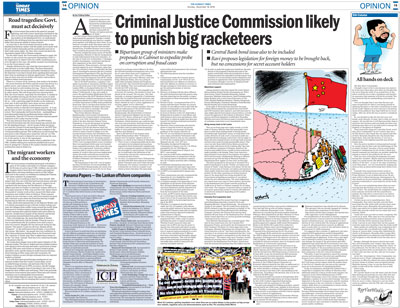
Our Political Editor is on leave this week


Leave a Reply
Post Comment